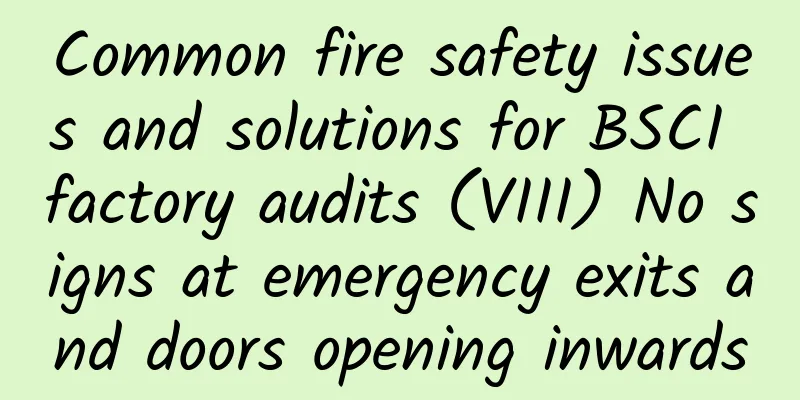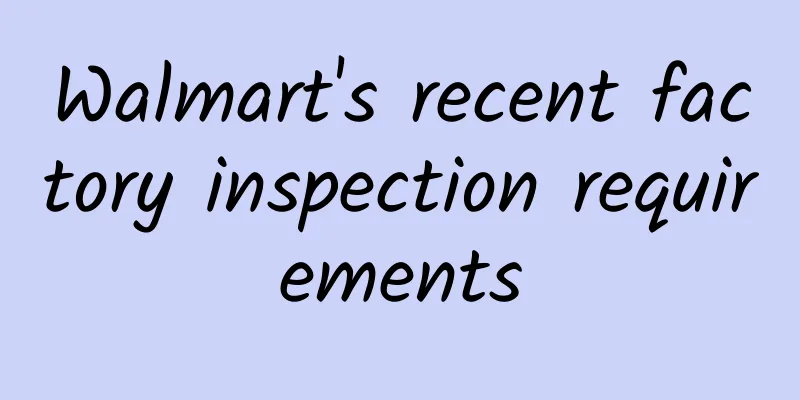ICTI Factory Audit Factory Status Terms and Definitions

|
From the moment a factory applies for ICTI factory inspection, it will be in different statuses on the ICTI official website. So, what are the specific statuses? What do these states mean? Let's take a look at them together: In Audit Progress - The factory is undergoing any necessary audit procedures and is not yet eligible to receive a certificate of compliance. Inactive - the factory is in its first ICP audit cycle and has not yet been issued an ICP compliance certificate. It still cannot meet the ICP after 3 audits. standards. Terminated - the validity of the compliance badge held by the factory has been terminated, or the new applicant factory has seriously violated the ICTI Code of Business Conduct. (COBP) and ICP processes and procedures, you must wait at least 6 months after the termination date before you can reapply. It may also refer to arrears of payment and/or Termination status due to failure to complete the ICP review within the specified time. Expired——The validity of the compliance badge held by the factory has expired. This status may also be due to the factory not having any compliance certification before or after the expiration of the certificate. Annual registration application. Class A——A-level certificate, the highest level of compliance badge, is issued to those who have been audited, have no serious violations, and have been transparently and publicly implemented. The working hours per week do not exceed 66 hours.
Factories where the weekly working hours do not exceed 60 hours. Class A Since [which year]——equivalent to Class A certificate, indicating that the factory has been working no more than 66 hours per week for the third year or more. Class B——B-level certificate, the second level of regular badges, is issued to those who have been audited, have no serious violations, and have transparently disclosed their actual Factories with weekly working hours of more than 66 but less than 72 hours Class C - Class C certificate, the third level of conventional badges, means that the factory has been audited, has no serious violations, and has transparently disclosed actual Factories with weekly working hours exceeding 72 hours are implementing continuous improvement plans to reduce working hours in order to obtain higher certification levels. On Probation - Observation period certificate, that is, the factory is under ICP supervision (3 audits within 1 year), ensuring that the factory is in the observation period Comply with ICP's Code of Business Conduct and commit to continuous improvement. Factories are usually found to have serious violations and opacity during audits. Was placed under observation. What do these states mean? Let's take a look at them together: In Audit Progress - The factory is undergoing any necessary audit procedures and is not yet eligible to receive a certificate of compliance. Inactive - the factory is in its first ICP audit cycle and has not yet been issued an ICP compliance certificate. It still cannot meet the ICP after 3 audits. standards. Terminated - the validity of the compliance badge held by the factory has been terminated, or the new applicant factory has seriously violated the ICTI Code of Business Conduct. (COBP) and ICP processes and procedures, you must wait at least 6 months after the termination date before you can reapply. It may also refer to arrears of payment and/or Termination status due to failure to complete the ICP review within the specified time. Expired——The validity of the compliance badge held by the factory has expired. This status may also be due to the factory not having any compliance certification before or after the expiration of the certificate. Annual registration application. Class A——A-level certificate, the highest level of compliance badge, is issued to those who have been audited, have no serious violations, and have been transparently and publicly implemented. The working hours per week do not exceed 66 hours.
Factories where the weekly working hours do not exceed 60 hours. Class A Since [which year]——equivalent to Class A certificate, indicating that the factory has been working no more than 66 hours per week for the third year or more. Class B——B-level certificate, the second level of regular badges, is issued to those who have been audited, have no serious violations, and have transparently disclosed their actual Factories with weekly working hours of more than 66 but less than 72 hours Class C - Class C certificate, the third level of conventional badges, means that the factory has been audited, has no serious violations, and has transparently disclosed actual Factories with weekly working hours exceeding 72 hours are implementing continuous improvement plans to reduce working hours in order to obtain higher certification levels. On Probation - Observation period certificate, that is, the factory is under ICP supervision (3 audits within 1 year), ensuring that the factory is in the observation period Comply with ICP's Code of Business Conduct and commit to continuous improvement. Factories are usually found to have serious violations and opacity during audits. Was placed under observation. |
<<: ALDI factory inspection requirements——BSCI
>>: Detailed version of holiday and anniversary leave policy
Recommend
How to find LED buyers information? What categories are they divided into?
There are many sellers who engage in foreign trad...
Main features of ISO14001 environmental management system
What are the main features of ISO14001? The ISO14...
Ann Taylor and Urban Outfitters fell; Goldman Sachs downgraded the two companies
Ann Taylor and Urban Outfitters fell; Goldman Sac...
Implementation of BSCI Social Responsibility German Industry Standards
1. Implementation steps of social responsibility ...
Shopify experience is here, Shopify newbies click here!
How to open a Shopify store? What experiences can...
What is the IPPC mark? Why should we apply the IPPC mark?
What is the IPPC mark? The IPPC logo is the inter...
VAT cross-border finance and taxation: How to register a German VAT account?
Why do we need to apply for VAT? According to the...
Characteristics of implementing ISO9000 quality assurance system
The main features of the implementation of ISO900...
EICC Certification Health and Safety Audit
1. Factory building structure safety certificate ...
Common wage and working hours issues and solutions during BSCI factory audits (IV) Employee leave requests do not match actual attendance records
Problem phenomenon: The leave request does not ma...
Reddit - Social News Site
Reddit is a social news site with the slogan: Voi...
Poccupine — Borderless Payment Gateway
What is Poccupine? Poccupine is an international ...
eBay Operating Rules | What are the eBay product infringement rules?
Remember the Fingerling Monkey infringement incid...
Is carbon trading the buying and selling of carbon?
What are carbon credits? Carbon credits, also kno...
Indiegogo - One of the First Crowdfunding Sites
What is Indiegogo? Indiegogo is one of the first ...









